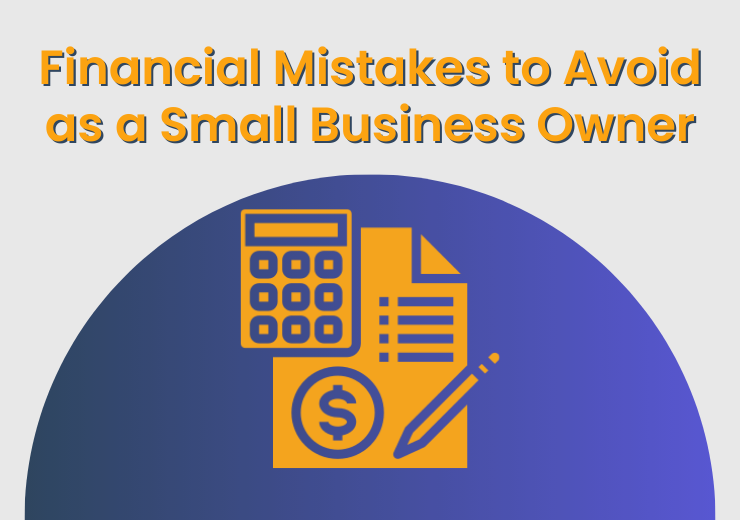Starting and running a small business can be a thrilling journey, but it also comes with its fair share of financial challenges. To ensure the success and longevity of your venture, it’s crucial to steer clear of common financial pitfalls. In this article, we’ll explore the top financial mistakes that small business owners should avoid at all costs. By being aware of these pitfalls and taking proactive steps to avoid them, you can set your business on the path to financial stability and prosperity.
Neglecting a Business Plan
One of the first financial mistakes small business owners make is not having a well-thought-out business plan. A business plan is not just a formality; it serves as your roadmap to success. It outlines your goals, strategies, and financial projections.
Mixing Personal and Business Finances
This common mistake can lead to confusion and financial chaos. It’s essential to keep your personal and business finances separate. Mixing them can make it challenging to track expenses, taxes, and profits accurately.
Underestimating Startup Costs
Starting a business often requires more capital than initially anticipated. Underestimating startup costs can lead to financial strain and jeopardize your business’s sustainability. It’s essential to conduct thorough research and budget for all necessary expenses.
Ignoring Cash Flow Management
Cash flow is the lifeblood of any small business. Failing to manage your cash flow effectively can lead to cash shortages, making it difficult to pay bills or invest in growth opportunities. Regularly monitor your cash flow and plan accordingly.
Failing to Budget Effectively
Budgeting is crucial for financial stability. Without a clear budget, it’s easy to overspend or allocate resources inefficiently. Create a detailed budget that accounts for all expenses and revenues.
Overlooking Tax Planning
Taxes can significantly impact your bottom line. Small business owners often make the mistake of not planning for taxes adequately. Consult with a tax professional to minimize your tax liability legally.
Not Monitoring Expenses Closely
Small expenses can add up quickly and eat into your profits. Regularly review and scrutinize your expenses to identify areas where you can cut costs without sacrificing quality.
Inadequate Record Keeping
Accurate record-keeping is essential for financial transparency and compliance. Neglecting this aspect can lead to legal and financial troubles. Invest in reliable accounting software or hire a professional bookkeeper.
Avoiding Professional Financial Advice
Many small business owners try to handle all financial matters themselves. While it’s essential to be informed, seeking professional financial advice can provide valuable insights and prevent costly mistakes.
Relying Too Heavily on Debt
While taking on debt may be necessary for growth, relying too heavily on it can lead to financial instability. Strive to find a balance between debt financing and equity financing to avoid overburdening your business with debt payments.
Neglecting Customer Credit Policies
Extending credit to customers is a common practice, but failing to establish clear credit policies can result in late payments or defaults. Create and enforce credit policies to minimize the risk of unpaid invoices.
Overexpanding Too Quickly
Expanding your business is exciting, but it should be done strategically. Overexpanding without sufficient resources or a solid customer base can lead to financial strain.
Falling Behind on Invoicing
Timely invoicing is essential to maintain a healthy cash flow. Delayed invoicing can result in delayed payments, which can impact your ability to cover expenses and grow your business.
Overlooking Insurance Needs
Insurance is often an afterthought for small business owners. However, unexpected events like accidents or lawsuits can have a severe financial impact. Evaluate your insurance needs and ensure you’re adequately covered.
Failing to Adapt to Market Changes
Markets are dynamic, and failing to adapt to changes can leave your business struggling. Stay informed about industry trends and be willing to pivot your business strategies when necessary.
Conclusion
Avoiding these financial mistakes is crucial for the long-term success of your small business. Financial stability and prudent management are the keys to thriving in a competitive marketplace. By taking the time to plan, budget, and seek professional advice when needed, you can navigate the challenges of entrepreneurship with confidence.
Frequently Asked Questions
-
Is it necessary to hire a professional accountant for my small business?
It’s highly recommended to seek professional financial advice or hire an accountant to ensure your finances are well-managed and compliant with tax regulations.
-
How often should I update my business budget?
Regularly review and update your budget, especially when there are significant changes in your business operations or financial goals.
-
What are some signs that my business may be in financial trouble?
Warning signs include consistent cash flow problems, declining profits, increasing debt, and difficulty in paying bills on time.
-
How can I improve my cash flow management?
Improving cash flow involves tracking expenses, invoicing promptly, offering discounts for early payments, and managing inventory efficiently.
-
Are there government programs that can help small businesses with financial challenges?
Yes, there are various government programs, grants, and loans designed to support small businesses during tough times. Research and apply for those that are relevant to your business.

